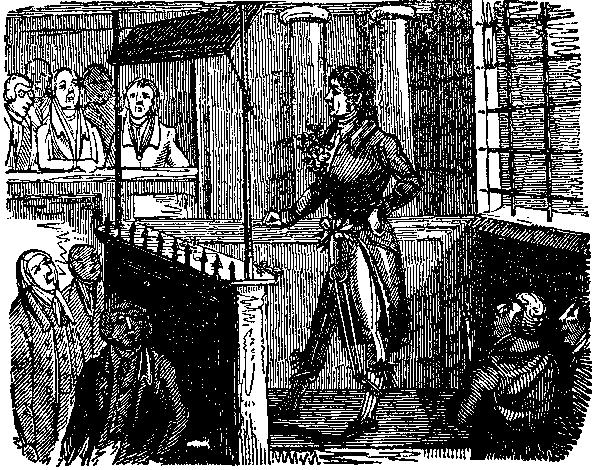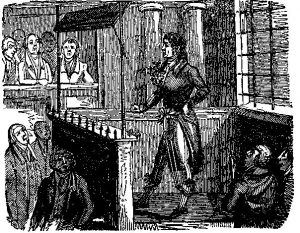
What was a highwayman?
Highwaymen as they were dubbed in Britain, and elsewhere known as land-pirates. Mainly because they robbed mail & stagecoaches. They were also often referred to as road agents, or bushrangers, and in Ireland, sometimes as Rapparees. Whatever were outlaws who plied their trade along the travelled highways of the world. In Britain and Ireland, they were active for around 200 years, between the early 17th and 19th centuries. John Rann, also known as “Sixteen String Jack”, was a prominent highwayman of the mid-18th century, particularly renowned for his wit and charm.
Here’s an account of the short but colourful life of the highwayman, John Rann:

Image Credit: Wikipedia. org
John Rann The early days
John Rann was born around 1750, near Bath in Somerset. Not much is known of his childhood other than he was from an extremely poor family, and alas, received no formal education. Growing up, he helped his family to eke out a meagre living by selling bric-a-brac in the streets. He obviously acquired the ‘gift of the gab’ at a young age, since at only 12 years old, he was able to persuade the local ‘Lady of the Manor’ to give him a job as a servant.
He stuck the job out for a couple of years but the ambitious Rann then found employment at a stable in Brooke’s Mews in London. It wasn’t long before Rann had secured a job as a coach driver. Living in the capital, he quickly acquired a taste for the good life and was soon living well beyond his means. He becomes ‘a man about town’ and liked to be seen wearing only the most expensive and outlandish clothes. He attended London’s best balls and galas, normally the preserve of the wealthy. Not surprisingly, because of his lavish lifestyle, he constantly found himself in debt.
Humble Criminal Beginnings
John Rann began his criminal career as a pickpocket with some success. However, he found the rewards weren’t enough, so he upped his criminal status to that of a highwayman. A risky business, considering it was viewed as a capital crime. He was arrested several times in quick succession on charges of highway robbery but on each occasion, the cases were dismissed due to lack of witness evidence.
At a trial in Bow Street, Rann appeared wearing a coat sporting numerous flowers and with his irons draped in blue ribbons. When noted presiding magistrate, Sir John Fielding asked Rann if he had anything to say in his defence, his reply was that; “I know no more of the matter than you do or half as much”.
Given John Rann’s growing reputation as a criminal, it would seem reasonable that he would want to keep a low-profile, but that just wasn’t his style. Far from staying in the shadows, the flamboyant highwayman liked to boast openly of his criminal exploits. It’s said that Rann often compared himself to Robin Hood, and while it’s well documented that he robbed the rich, there’s nothing to suggest he ever gave to the poor.
Nevertheless, he revelled in the limelight, on one occasion turning up at Barnet Races, dressed in a silver trimmed blue satin waistcoat. Standing out from the crowd, it was reported on that he had “dressed like a sporting peer of the first rank”.
Sixteen String Jack
It was his ostentatious dress sense that earned John Rann the nickname of “Sixteen String Jack”. He’d taken to wearing silk breeches, which always had eight silver-tipped strings of various colours on each leg, displayed just below the knee. Hence, the moniker, of which it was said that each string represented a court acquittal. Speaking volumes of his character, he once famously turned up at Tyburn to watch an execution.
Rann’s loud, witty banter at the event, meant it was he who became the centre of attention, rather than the poor wretch who was to be hung. Rann is said to have joked prophetically on that occasion that it wouldn’t be long before he was back as the main attraction.
In October 1774, John Rann’s final trial took place at The Old Bailey, shortly after he was arrested for highway robbery. He, along with accomplice William Collier, was accused of robbing the Reverend Dr William Bell on 26 September. The high-profile Dr Bell was the chaplain of Princess Amelia, the youngest daughter of George III. Part of the proceeds from the robbery was a bespoke watch, made by Gregnions of Covent Garden.
When Eleanor Roach, a mistress of Rann’s had tried to pawn the unique watch, it had tied the highwayman to the crime. Rann was held in custody at Newgate Gaol, where he is reported to have entertained seven of his girlfriends at a farewell dinner on the eve of his execution.
A Sticky End
On 30 November, John Rann was transported to Tyburn to face his public hanging. He was dressed in a newly tailored pea-green suit, sporting a large nosegay in the buttonhole. According to reports he is said to have indulged in witty, cheerful banter with both the hangman and the large crowd, that had gathered. One member of the observing public was James Boswell, the noted 18th-century writer, diarist, biographer, and friend of Samuel Johnson.
When Rann performed a jig, just before his execution, according to Boswell, he was cheered by “the whole vagabond population of London”. The Newgate Calendar, a bulletin that reported on executions, narrated that “when he came near the gallows he turned around, and looked at it as an object which he had long expected to see, but not as one that he dreaded, as might reasonably have been expected.”
It seemed almost inevitable that by John Rann’s own fruition his life would come to a premature end. He was just twenty-four years old when he was executed.
The Legend
A play about John Rann, entitled ‘Sixteen String Jack’, was a hit for the new playwright, William Leman Rede, in 1823. He also released a novel based on Rann’s life, which was published in 1841, also with the title ‘Sixteen String Jack’.
The Sixteen String Jack character also featured prominently in the Penny Bloods, along with other notorious highwaymen, such as Dick Turpin, Claude Duvall and Jack Sheppard. First published in the 1830s, and later called ‘Penny Dreadfuls’, they were cheap comic-style publications, featuring weekly serialised stories that told sensationalised tales on the exploits of pirates, highwaymen, and the like.
A TV production company that largely make programmes for the American HBO channel have adopted the name ‘Sixteen String Jack’ Productions.
If you’ve enjoyed reading this article, you can find other features on notorious highwaymen by clicking Here.






… [Trackback]
[…] Find More on that Topic: fiveminutesspare.com/education/highwayman-john-rann/ […]
… [Trackback]
[…] Here you can find 50670 additional Information on that Topic: fiveminutesspare.com/education/highwayman-john-rann/ […]
… [Trackback]
[…] Information on that Topic: fiveminutesspare.com/education/highwayman-john-rann/ […]
… [Trackback]
[…] Here you will find 17069 additional Information to that Topic: fiveminutesspare.com/education/highwayman-john-rann/ […]
… [Trackback]
[…] Read More Info here on that Topic: fiveminutesspare.com/education/highwayman-john-rann/ […]
… [Trackback]
[…] Information to that Topic: fiveminutesspare.com/education/highwayman-john-rann/ […]
… [Trackback]
[…] Here you will find 22913 additional Info on that Topic: fiveminutesspare.com/education/highwayman-john-rann/ […]
… [Trackback]
[…] Info on that Topic: fiveminutesspare.com/education/highwayman-john-rann/ […]
… [Trackback]
[…] Read More on that Topic: fiveminutesspare.com/education/highwayman-john-rann/ […]
… [Trackback]
[…] Read More on on that Topic: fiveminutesspare.com/education/highwayman-john-rann/ […]
… [Trackback]
[…] Find More Info here to that Topic: fiveminutesspare.com/education/highwayman-john-rann/ […]
… [Trackback]
[…] Read More to that Topic: fiveminutesspare.com/education/highwayman-john-rann/ […]
… [Trackback]
[…] Read More to that Topic: fiveminutesspare.com/education/highwayman-john-rann/ […]
… [Trackback]
[…] There you will find 38611 more Information on that Topic: fiveminutesspare.com/education/highwayman-john-rann/ […]
… [Trackback]
[…] Read More Information here to that Topic: fiveminutesspare.com/education/highwayman-john-rann/ […]
… [Trackback]
[…] There you will find 63887 more Information on that Topic: fiveminutesspare.com/education/highwayman-john-rann/ […]
… [Trackback]
[…] Read More on on that Topic: fiveminutesspare.com/education/highwayman-john-rann/ […]
… [Trackback]
[…] Read More to that Topic: fiveminutesspare.com/education/highwayman-john-rann/ […]
… [Trackback]
[…] Information to that Topic: fiveminutesspare.com/education/highwayman-john-rann/ […]
… [Trackback]
[…] Read More Information here to that Topic: fiveminutesspare.com/education/highwayman-john-rann/ […]
… [Trackback]
[…] Read More on to that Topic: fiveminutesspare.com/education/highwayman-john-rann/ […]
… [Trackback]
[…] Find More on on that Topic: fiveminutesspare.com/education/highwayman-john-rann/ […]
… [Trackback]
[…] Read More on to that Topic: fiveminutesspare.com/education/highwayman-john-rann/ […]
… [Trackback]
[…] Info on that Topic: fiveminutesspare.com/education/highwayman-john-rann/ […]
… [Trackback]
[…] Information to that Topic: fiveminutesspare.com/education/highwayman-john-rann/ […]
… [Trackback]
[…] There you will find 41380 additional Info to that Topic: fiveminutesspare.com/education/highwayman-john-rann/ […]
… [Trackback]
[…] Read More on that Topic: fiveminutesspare.com/education/highwayman-john-rann/ […]
… [Trackback]
[…] Find More Info here to that Topic: fiveminutesspare.com/education/highwayman-john-rann/ […]
… [Trackback]
[…] Here you will find 76660 additional Info on that Topic: fiveminutesspare.com/education/highwayman-john-rann/ […]
… [Trackback]
[…] Find More Info here to that Topic: fiveminutesspare.com/education/highwayman-john-rann/ […]
… [Trackback]
[…] There you can find 21881 additional Info on that Topic: fiveminutesspare.com/education/highwayman-john-rann/ […]
… [Trackback]
[…] Information to that Topic: fiveminutesspare.com/education/highwayman-john-rann/ […]
… [Trackback]
[…] Find More to that Topic: fiveminutesspare.com/education/highwayman-john-rann/ […]
… [Trackback]
[…] Find More Info here on that Topic: fiveminutesspare.com/education/highwayman-john-rann/ […]